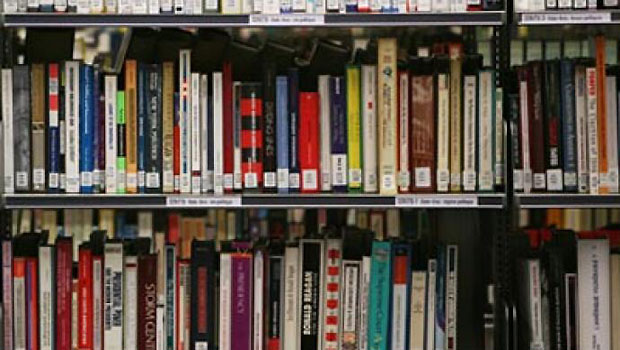
File photo of books on a library shelf. (AFP Photo/Loic Venance)
London, Asharq Al-Awsat—Does the Arabic novel enjoy popularity in the West? What is the proportion of those who read the Arabic novel in the West, in comparison to those who read Turkish, Afghan, or Indian novels? Just who is reading fiction translated from Arabic?
These are just some of the questions that Asharq Al-Awsat put to a number of prominent Arab novelists and writers in an attempt to understand the place that Arab literature holds in the West. In the first of a four-part series, Asharq Al-Awsat spoke to Hanan Al-Shaykh, a Lebanese novelist, short-story writer, journalist and playwright. Her books seek to challenge the roles of women in the traditional social structures of the Middle East. She is one of the leading contemporary women writers in the Arab world and is known for her forceful books, such as Women of Sand and Myrrh and The Locust and the Bird: My Mother’s Story. Shaykh’s novels have been translated into English, French, Dutch, German, Danish, Italian, Korean, Spanish and Polish.
Speaking exclusively to Asharq Al-Awsat, she said:
“Like many, Westerners in one way or another believe that Egypt is Umm Al-Dunya (the mother of the world) and the most important Arab country.
“I do not think that the English are interested in Lebanese, Syrian or North African novels in general. I think that Palestine comes next in terms of English people’s interest in the Arabic novel, given the political events taking place in Palestine and the Palestinian–Israeli conflict.
“The Palestinian novel received more attention following the visits made by Emile Habibi, the Palestinian novelist, and Edward Saïd, the world-acclaimed academic, to London. In fact, they helped convey the Palestinian viewpoint to the English-speaking public.
“As for myself, I cannot be ignored given that I have been active in the UK for many years. In addition to this, writing plays has increased my readership, particularly given that the theater has traditionally enjoyed a larger audience.
“English speakers are not interested in Arab issues in general; however, they are interested in novels that tell interesting stories. This was obvious with Hisham Matar’s In the Country of Men, which tells that story of his father who disappeared in ambiguous circumstances in Egypt. Some Saudi female writers have attracted Western attention as well.
“My book, The Locust and the Bird: My Mother’s Story, achieved enormous popularity in the West. In fact, all of these novels tell interesting stories. Nevertheless, had my book been written by an Indian author, it would have definitely been more popular.
“All in all, translated Arabic books are not so popular in the UK. Besides, concerned about quality, British publishers only sign with writers whose books are expected to make considerable profits; they do not like to make a loss.
“This is why the Arabic novel does not enjoy much readership in the UK. Ahdaf Soueif’s The Map of Love used to be a bestseller, given the English public’s passion for Egypt.
“I once met a culture editor at one of the UK’s major newspapers. When I introduced myself to him as a fiction writer, he responded in wonder: “I never knew that Arab women write.” I jokingly presented to him one of my books and asked him to confirm that the picture on the book is mine and that I am the real author of the book.”
The second part of this series, featuring the France-based Moroccan critic and short-story writer Mohammed El-Mezdioui, will be published tomorrow.

Trackbacks/Pingbacks